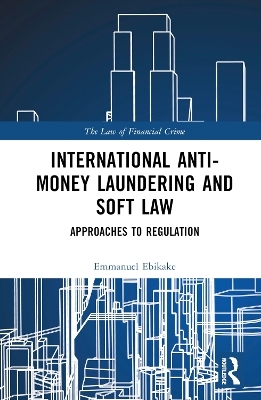
International Anti-Money Laundering and Soft Law
Approaches to Regulation
Seiten
2023
Routledge (Verlag)
978-1-032-44924-1 (ISBN)
Routledge (Verlag)
978-1-032-44924-1 (ISBN)
Adopting a mixed-methods approach, this book assesses the role of soft law as a technique to repress and prevent Money Laundering.
Adopting a mixed-methods approach, this book assesses the role of soft law as a technique to repress and prevent money laundering.
The consequence of the combination of a non-traditional subject matter with the limitations of traditional international law instruments has meant that lawmakers seeking international solutions to the problems of money laundering have had to innovate. This book addresses two fundamental issues in the context of existing international and domestic responses to the problem of money laundering that have hitherto been neglected. These include the nature of the treaty obligations to criminalise money laundering, and the role of soft law as a technique to regulate it globally. The book concludes that international legal harmonisation and approximation of domestic anti-money laundering law through soft law remains helpful in addressing this pressing problem.
The book will be of interest to academics, researchers, and policy-makers working in the areas of Financial Crime, Anti-Money Laundering Law, Regulation, International Soft Law, and Comparative Law.
Adopting a mixed-methods approach, this book assesses the role of soft law as a technique to repress and prevent money laundering.
The consequence of the combination of a non-traditional subject matter with the limitations of traditional international law instruments has meant that lawmakers seeking international solutions to the problems of money laundering have had to innovate. This book addresses two fundamental issues in the context of existing international and domestic responses to the problem of money laundering that have hitherto been neglected. These include the nature of the treaty obligations to criminalise money laundering, and the role of soft law as a technique to regulate it globally. The book concludes that international legal harmonisation and approximation of domestic anti-money laundering law through soft law remains helpful in addressing this pressing problem.
The book will be of interest to academics, researchers, and policy-makers working in the areas of Financial Crime, Anti-Money Laundering Law, Regulation, International Soft Law, and Comparative Law.
Emmanuel Ebikake is a Solicitor of England and Wales, a Barrister of the Supreme Court of Nigeria, and a law tutor.
Preface. Table of Cases. Table of International Treaties and Other Documents. List of Soft Law Instruments and Bodies. List of Abbreviations. Chapter 1: Significance of an International Anti-Money Laundering Control and the Challenges. Chapter 2: Identifying Soft Law. Chapter 3: Money Laundering: Nature of the Problem and the Legal Response. Chapter 4: Repressive Anti-Money Laundering Control. Chapter 5: Preventive Anti-Money Laundering Control. Chapter 6: International Cooperation and the Role of FIUs. Chapter 7: Jurisdictional Role of the Money Laundering Law. Conclusion. Bibliography. Index
| Erscheinungsdatum | 18.11.2023 |
|---|---|
| Reihe/Serie | The Law of Financial Crime |
| Zusatzinfo | 1 Line drawings, black and white; 1 Illustrations, black and white |
| Verlagsort | London |
| Sprache | englisch |
| Maße | 156 x 234 mm |
| Gewicht | 612 g |
| Themenwelt | Recht / Steuern ► EU / Internationales Recht |
| Recht / Steuern ► Strafrecht ► Kriminologie | |
| Recht / Steuern ► Wirtschaftsrecht ► Bank- und Kapitalmarktrecht | |
| Wirtschaft ► Volkswirtschaftslehre | |
| ISBN-10 | 1-032-44924-1 / 1032449241 |
| ISBN-13 | 978-1-032-44924-1 / 9781032449241 |
| Zustand | Neuware |
| Informationen gemäß Produktsicherheitsverordnung (GPSR) | |
| Haben Sie eine Frage zum Produkt? |
Mehr entdecken
aus dem Bereich
aus dem Bereich
klare Antworten aus erster Hand
Buch | Softcover (2023)
UTB (Verlag)
19,90 €


